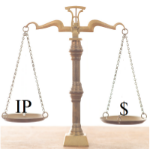
by Kathleen Lynch | Feb 12, 2016 | Intellectual Property
A recent Federal Circuit Court of Appeals decision highlights the need to ensure that contracts with third parties ensure that any intellectual property developed is owned by the company. In TriReme Med., LLC v. AngioScore, Inc., TriReme sued to correct inventorship on some AngioScore patents directed to angioplasty balloon catheters. AngioScore had hired a consultant, Dr. Lotan. Dr. Lotan was not named as an inventor in any of the AngioScore patents at issue. TriReme, motivated by a concern that AngioScore may sue for patent infringement, acquired from Dr. Lotan, all of his interest in the subject AngioScore patents.
AngioScore offered up the consulting agreement executed with Dr. Lotan in defense. AngioScore asserted that it obtained all rights in all inventive works by Dr. Lotan.
The Federal Circuit disagreed. The court found that the agreement did not give AngioScore rights to Dr. Lotan’s inventions developed or made prior to the agreement and remanded the case back to district court to determine whether the language in the agreement grants AngioScore rights in any inventive developments made by Dr. Lotan after that execution of the agreement.
What’s the take away here? When contracting with any third party, be sure to cover all aspects of ownership of any intellectual property developed during the term of the agreement. Also ensure that all parties to the agreement have a clear understanding as to who is entitled to what when dealing with IP developed by the third party either before or after the term of the agreement.
Protecting your innovative developments is critical to any organization. Having the right person to help you make that decision is important. The Law Office of Kathleen Lynch PLLC is designed to help businesses such as yours keep ahead of the game. The first telephone consultation is free. Email us at [email protected].

by Kathleen Lynch | Feb 25, 2015 | Copying, Copyright, Infringement, Intellectual Property
If anyone caught the halftime show at the Super Bowl this year, you may remember the dancing sharks that were a part of Katy Perry’s halftime show. The sharks were an instant sensation, particularly the left shark who was seen dancing awkwardly behind Ms. Perry. Now one businessman has tried to capitalize on that.
Fernando Sosa is in the 3D printing business. Mr. Sosa makes and sells 3D printed sculptures typically of political figures. After the Super Bowl, Mr. Sosa developed and offered for sale a replica “Left Shark” figure. Attorneys for Katy Perry quickly fired off a cease and desist letter to Mr. Sosa claiming that the figure infringed Katy Perry’s intellectual property. In particular, the letter alleged that Mr. Sosa’s selling of the shark figurine violated Ms. Perry’s copyrights in the shark. Mr. Sosa has agreed to stop selling the shark.
According to CNN, Mr. Sosa remarked “ it looks like dictators and world leaders like Putin and Kim Jong Un or Chris Christie are much easier to deal with,” and “all this lawyer crap is stressful.”
Take away: before considering copying something in a public domain, think about whether any third party may have rights to the subject matter. This applies to sharks as well as digital images and content on the internet. Even though a digitized item can be downloaded, doesn’t mean it should be. One way to err on the side of caution is to check the ownership of the item. If a copyright notice accompanies the material that indicates the owner. Most owners can be contacted and some may grant a license to you to use their image or content (or shark) as you would like. However, it is the owner’s right to grant and not yours to take.
Protecting your innovative developments and respecting the intellectual property rights of third parties is critical to any organization. Having the right person to help you make those decisions is important. The Law Office of Kathleen Lynch PLLC is designed to help businesses such as yours keep ahead of the game. The first telephone consultation is free. Email us at [email protected].

by Kathleen Lynch | Nov 13, 2014 | Copyright, Intellectual Property
This is one in a series of posts covering some basic aspects of intellectual property law. Previous posts touch on patents (parts 1 and 2) and trademarks (parts 3 and 4). This post will cover the general elements of copyright law.
Copyright law protects the expression of an idea fixed in a tangible medium. Thus, the protection is more limited than other aspects of intellectual property law. However, if copyright infringement is found, relief to the copyright owner can include an order against further infringement as well as money damages which can range from between $200 and $300,000 per act of infringement. Damages may also include attorneys’ fees and costs. Infringers may also be subject to criminal prosecution and may be imprisoned if found guilty.
Types of works covered by copyright law include:
- literary;
- musical;
- dramatic;
- pantomimes and choreographic works;
- pictorial, graphic, and sculptural works;
- audiovisual works;
- sound recordings;
- derivative works;
- compilations; and
- architectural works.
In order to proceed with a copyright infringement action, you must register your work with the United States Copyright Office. This can be done online on their website.
Copyright notice is given by using “©” followed by the year or years in which the work was published and the owner. In addition, a statement such as “all rights reserved” or “no unauthorized use permitted” may follow the notice. This puts the public on notice of your intent to enforce your rights via copyright law.
Protecting your innovative developments is critical to any organization. Having the right person to help you make that decision is important. The Law Office of Kathleen Lynch PLLC is designed to help businesses such as yours keep ahead of the game. The first telephone consultation is free. Email us at [email protected].

by Kathleen Lynch | Sep 2, 2014 | Intellectual Property
This week I am highlighting a recent article written by Mark Schultz and Adam Mossoff on the connection between intellectual property rights and economic prosperity. In sum, the article makes an excellent connection between the strength of a country’s IP system to that of its economy.
One could argue that a country like China that has not historically enforced intellectual property still has a strong economy. But China has made progress in their IP system and the enforcement of intellectual property rights under that system.
In general, the evidence seems to indicate that where intellectual property rights are protected, and where innovation is encouraged, the economy will grow.

by Kathleen Lynch | Aug 26, 2014 | Confidentiality, Entrepreneur, Intellectual Property, Inventor, Patent, Trade Secrets
I had lunch with a colleague who is an IP attorney and an engineer. He was telling me about his participation in a start up weekend and all of the challenges and fun that he had. In hearing this, we discussed, as patent attorneys do, the consequences of disclosing ideas to a loosely held group of people whose only relationship to each other is on the back of a napkin.
Most start up weekends do not impose any obligation of confidentiality on their attendees for all that is developed and disclosed in a 48 hour period. This raised the concern that perhaps anything that is developed that may be rather meaningful, i.e. might lead to actual commercialization of a product or service, may need to be “black boxed”. In other words, the team of developers could agree to disclose only the basic outline of the structure and/or function of the development and then disclose the details of the operation once a patent application has been filed or a confidentiality agreement has been signed.
To do otherwise may jeopardize the group’s ability to seek meaningful protection which may likely translate directly into meaningful funding. The US patent system has moved to a first inventor to file system. In that system, the inventor has a year to file on the invention developed after it has been disclosed. The rest of the world essentially requires absolute novelty. So if any invention is disclosed prior to a patent filing, any international patent rights outside the US may be lost completely. This is something worth considering when venturing into a start up weekend.
One aspect of any new development is the extent of patent protection available to the ultimate product or service. If all international patent protection is lost by the close of a start up weekend as a result of disclosure, then the level of funding and any significant patent advantage may be lost. It remains that anyone involved in a start up weekend should ask the appropriate questions regarding disclosure with the organizers and raise any concerns with the team as it could impact the protection and funding of what may be developed during the weekend.
Protecting your innovative developments is critical to any start up venture. Having the right person to help you make that decision is important. The Law Office of Kathleen Lynch PLLC is designed to help businesses such as yours keep ahead of the game. The first telephone consultation is free. Email us at [email protected].









